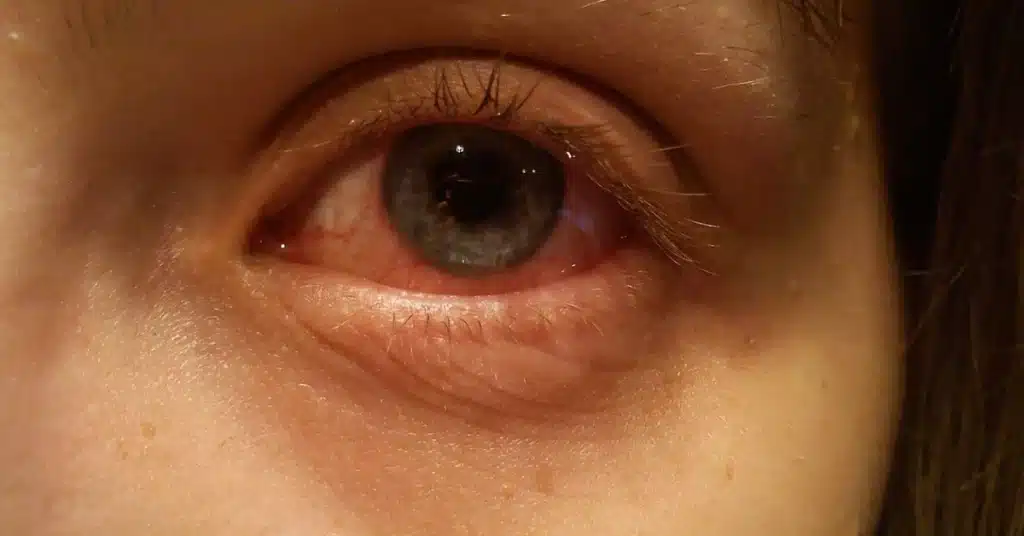Watery eyes, also known as Epiphora, can cause discomfort due to the overproduction of tears.
It can also occur due to poor drainage of tears from the eyes, in some cases.
Though tears are necessary for maintaining eye health, excessive tearing can be uncomfortable
In most circumstances, this issue resolves on its own.
However, in some cases, it can be an indication of a more significant and chronic condition.
Allergies, Dry Eye syndrome, infections, and underlying medical disorders such as Glaucoma are all possible causes of watery eyes.
This article will discuss various watery eyes causes and how to deal with them.
What causes watery eyes
Watery eyes refer to the excessive production of tears, which causes persistent discomfort.
Though tears are important for good eye health, excessive tearing might interfere with your daily activities.
Identifying and controlling the cause of watery eyes can provide relief and help protect eyesight.
Watery eyes can be caused by a variety of eye problems, including Dry Eyes, allergies, eye infections, and Keratitis.
Let’s discuss these watery eye causes in detail:
Allergies
 Source: Syda_productions
Source: Syda_productionsWhen an allergen, such as dust or pollen, comes into contact with the eyes, an allergy can develop.
As a defense mechanism, histamine is released, causing the small blood vessels of the eye to leak.
An allergy can cause a variety of symptoms, including eye pain, itching, red eyes, and watering.
Eye infections
Bacterial or viral eye infections such as Pink Eye (Conjunctivitis) can cause watery eyes.
Some of the other symptoms of Conjunctivitis are red eyes, sensitivity to light, and eye pain.
Early diagnosis and proper treatment are essential to relieve symptoms and restore eye health.
Healthcare professionals usually prescribe antiviral or antibiotics for eye infections.
The antibiotic prescribed for eye infection depends on the type and severity of the infection.
Dry Eyes
Dry Eyes refers to an eye condition which involves low tear production or rapid evaporation of tears.
In some individuals Dry Eyes can produce watering eyes.
Dry eyes are a major cause of eye pain, which can lead to watery eyes.
To avoid possible risks and side effects, it is critical to get medical assistance if you have Dry Eyes.
Keratitis
Keratitis is the inflammation of the cornea, often caused by prolonged use of contact lenses or eye injury.
Excessive tearing or watery eyes is a common symptom of Keratitis.
Seeking medical attention is essential for early and proper diagnosis and relieving watery eyes.
Blocked tear ducts
In some individuals, blocked tear ducts can also lead to watery eyes.
When the system that drains tears from the eyes gets blocked, tears can build up and cause excessive tearing.
Eyelid problems such as Ectropion or Entropion can produce watery eyes in certain individuals.
Such eye disorders disturb tear distribution and drainage, resulting in watery eyes.
Entropion is an inversion or turning inward of the eyelid edge.
When to seek medical help for watery causes
 Source: Elena Safonova
Source: Elena SafonovaWatery eyes are a common symptom that many individuals face daily.
It usually goes away on its own and does not require medical attention.
However, if the problem persists or worsens, an individual should seek medical attention.
In general, determining the cause of watery eyes and controlling it with medications, artificial tear drops, and lifestyle modifications might be beneficial.
If the source of the watery eyes is a bacterial illness, antibiotic eye drops may be more helpful.
Seek medical attention immediately if you have watery eyes or other eye conditions.
Summing up
Watery eyes can be irritating and uncomfortable, affecting your daily life.
It is a common eye symptom and various causes can lead to watery eyes.
Eye infections, Dry Eyes, Keratitis, Blocked tear ducts, and allergies can lead to watery eyes.
Identifying what causes watery eyes will help you manage the condition and get rid of it.
Watery eyes typically resolve on their own and do not require medical care.
Individuals should seek medical assistance if the problem persists or worsens.
Frequently Asked Questions
What is the most common cause of watery eyes?
The most common cause of watery eyes is dry eye syndrome.
Insufficient tear production leads to irritation, prompting the eyes to compensate by producing excessive tears, resulting in tearing and discomfort.
Can dehydration cause watery eyes?
Yes, dehydration can cause watery eyes.
When the body is dehydrated, it may produce more reflex tears to compensate for the lack of natural lubrication.
Staying well-hydrated is essential for maintaining the balance of tear production and preventing excessive tearing.
Are watery eyes always a sign of an underlying problem?
No, not always, but persistent or recurring watery eyes can be a sign of a more serious condition, such as Dry Eyes or allergies.
For a proper diagnosis, consult a healthcare expert.
Can Diabetes cause watery eyes?
Yes, Diabetes can contribute to watery eyes.
The condition may affect the function of the tear glands, leading to an imbalance in tear production.
Additionally, Diabetes-related complications can impact overall eye health, potentially causing symptoms such as excessive tearing.
Regular eye check-ups are crucial for individuals with Diabetes.
When is surgery needed for watery eyes?
Surgery is often considered for severe cases of watery eyes caused by complications such as blocked tear ducts or eyelid abnormalities when other therapies have failed.
Your eye specialist will assess your specific situation and advise you on the best course of action.
When referencing outside resources, GoodrxMedicine always provides full citations. To learn more about the measures we use to maintain the quality of our content, please review our Content Information Policy.











